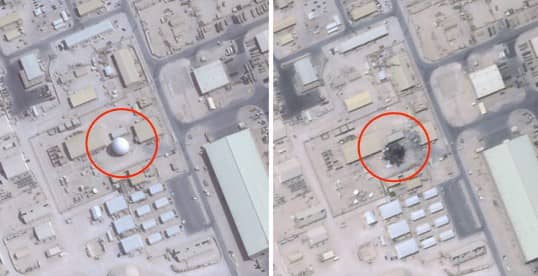By Burnett Munthali
The Pentagon has confirmed that Iran launched a barrage of missiles targeting a major United States military installation in Qatar last month.
One of the missiles successfully struck Al Udeid Air Base, a key hub for U.S. operations in the Middle East.
This revelation marks a significant escalation in regional tensions between the United States and Iran.
The missile attack was part of a broader offensive by Tehran, whose motives appear to be rooted in ongoing geopolitical disputes and regional military dynamics.
Satellite imagery obtained after the incident reveals visible damage to some of the base’s infrastructure.
Although the extent of the destruction has not been officially detailed, the imagery suggests that the impact was substantial enough to compromise parts of the facility.
Al Udeid Air Base, located southwest of Doha, is home to thousands of U.S. military personnel and serves as the headquarters for U.S. Central Command operations.
The attack underscores growing concerns about the vulnerability of American assets in the Gulf amid heightened hostilities.
The Pentagon has not disclosed whether there were any casualties resulting from the missile strike.
Military analysts are now assessing how this incident may affect the strategic posture of the U.S. in the region.
Iran’s decision to target such a high-profile base suggests a bold message of defiance against American military presence in the Middle East.
Washington has yet to issue a formal diplomatic response, but security officials have indicated that additional measures may be taken to deter future threats.
The missile strike on Al Udeid could further complicate ongoing negotiations on Iran’s nuclear program and broader U.S.-Iran relations.
Tensions between the two nations have steadily increased over the past year, with flashpoints emerging across Iraq, Syria, and now, the Gulf region.
This latest act of aggression may provoke a reassessment of U.S. defense strategies in allied countries such as Qatar, Kuwait, and the UAE.
As global attention shifts toward the aftermath of the attack, questions loom about whether the U.S. will retaliate militarily or opt for a diplomatic course.
For now, Al Udeid remains operational, but the attack has served as a wake-up call to American forces stationed abroad.
It has also sent a clear signal that Iran remains a formidable and unpredictable actor in the region’s complex geopolitical theater.
The world watches closely, as the consequences of this missile strike could echo far beyond the sands of Qatar.



